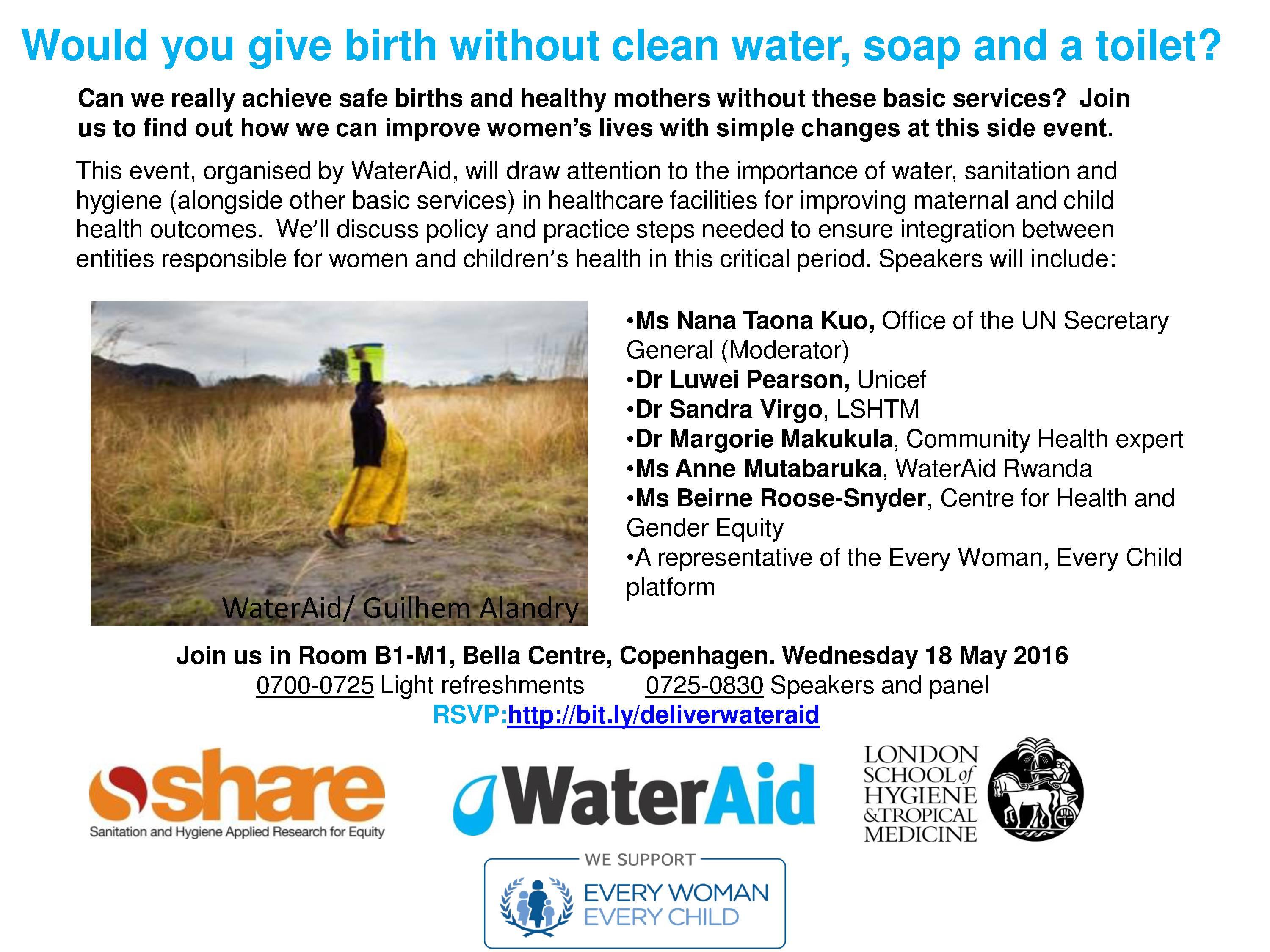SHARE at Women Deliver

Would you give birth without clean water, soap and a toilet?
This was the question asked by WaterAid, SHARE, the Soapbox Collaborative, the Frontline Healthworkers Coalition, the UN Foundation and IntraHealth International who jointly organised a side event at the 2016 Women Deliver conference in Copenhagen last week to draw attention to the importance of WASH in HCFs for improving maternal and child health outcomes.
I was asked to be a panellist at this event due to the Soapbox Collaborative's partnership with WaterAid in a project involving 16 rural Malawian health centres. The event was well attended, especially considering it started at 7am!
Introductions
After a screening of the powerful WaterAid film ‘Parallel Lives’, using a split-screen technique to illustrate the different experiences of midwives in the UK and Tanzania regarding the availability of clean, safe water, there was an introduction from WaterAid’s Margaret Batty.
UNICEF’s Dr Luwei Pearson said that collectively we have so far made a choice not to prioritise water, and that accountability is shared between development partners and governments.
Panel discussion
The panel discussion was moderated by Nana Kuo from the UN Secretary General’s Office. She mentioned that the ‘Transform Agenda’ of WHO’s updated Global Strategy for the Health of Women’s, Children’s and Adolescent’s Health is where WASH targets are clearly encompassed.
The first question for panellists was:
What’s the number one challenge in improving access to WASH and basic services in healthcare facilities?
Berne Roose-Snyder from the Center for Health and Gender Equity said that the key challenge was gender issues, especially in the context of disrespect and abuse suffered by women during childbirth. Donors do not find WASH a ‘sexy’ cause because the solutions are systemic. The answer is for advocates to make WASH every government’s problem.
Dr Marjorie Makukula, from the University of Zambia, said that there was a lack of government commitment to WASH in her country. Only policies and targets for facilities will hold them accountable. She described Zambian nurses choosing to use ‘brown water’ rather than ‘black water’ as the lesser of two evils.
Soapbox researchers find that the main challenge is showing that WASH matters and that it’s amenable to change – this especially in places where a sense of resignation has set in. Innovative training can help staff from doctors to cleaners understand their role in preventing infection transmission. Microbiological evidence can also be persuasive and can start an important conversation, for example in Zanzibar where research has led to mended toilets and improved cleaners’ training.
The next question for panellists was:
What can we do in the next year to improve access to WASH and basic services in healthcare facilities?
Dr Makukula indicated that governments need very specific quantitative targets which form part of a total package integrated into all basic healthcare services. Currently midwives are unable to do their jobs properly. Community and traditional leaders can encourage the people to start demanding WASH.
Ms Roose-Snyder said that participatory accountability mechanisms like measuring women’s satisfaction with the WASH environment could be very useful and help the demand side of a respectful and rights-based maternity care where there is accountability from facility level up to national level.
Soapbox also emphasised data collection which ties into WHO’s new commitments. Many facilities are still not doing routine audits of maternal and newborn sepsis, a situation complicated by the fact that people often seek treatment in a facility different from the one where infection is picked up.
Closing
In the summing-up by the UN Foundation's Anita Sharma and in the audience discussion, there was a general agreement that collaborating partners can help WASH to be pursued multisectorally under different agendas; for example: Quality of Care, respectful maternity care, disrespect and abuse, and antimicrobial resistance. This is in line with the SDGs’ cross-cutting themes and a great example is WaterAid’s Healthy Start campaign.
Final reflections
Attended by 5000-6000 policymakers, advocates and researchers from 160 countries, this conference provided an invaluable space for diverse stakeholders to discuss how we make the new SDGs matter most for girls and women, to showcase hundreds of solutions, and to build coalitions. We very much look forward to the next Women Deliver in 2019, where there will be achievements to report on WASH in HCFs!
